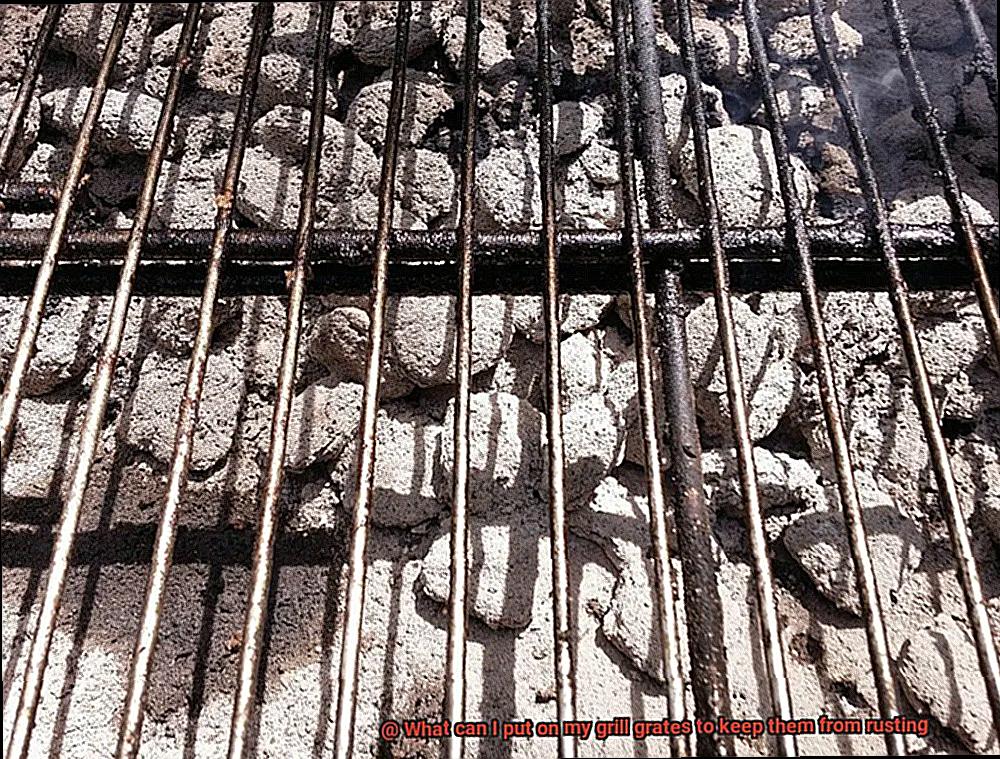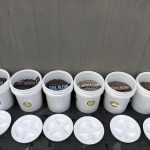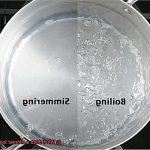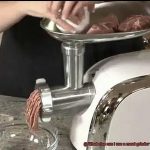Summer is finally here, and it’s time to fire up the grill for some mouth-watering barbeques with your loved ones. But what happens when you take a look at your grill grates and find them covered in rust? It’s not only an eyesore but also a potential health hazard as the rust can flake off into your food.
Don’t worry, though. There are several solutions to this problem that will keep your grill grates looking clean, shiny, and rust-free. In this post, we’ll explore different techniques to prevent rust from forming on your grill grates.
From seasoning your grill grates with oil to using specialized protective sprays, we’ve got you covered. Whether you’re a seasoned pro or just starting out, these tips will help ensure that your grilling experience is safe and enjoyable without any rust interference.
So don’t let rust ruin your summer cookouts. With a little bit of knowledge and the right technique, you can easily protect your grill grates and ensure they last for years to come. Let’s dive in and learn how to keep those grill grates rust-free all summer long.
Contents
Using Cooking Oil to Protect Against Rust
Say goodbye to rusty grill grates with a simple and affordable solution found right in your kitchen pantry – cooking oil. This popular and effective method creates a barrier between the metal and moisture, preventing rust from forming on cast iron or stainless steel grates.
To apply cooking oil, start by thoroughly cleaning the grates with a wire brush. Then, use a paper towel or rag to apply a thin layer of oil to the entire surface. Choose an oil with a high smoke point, such as vegetable or canola oil. But beware, you will need to reapply the oil regularly, especially after each use, as it will break down over time.
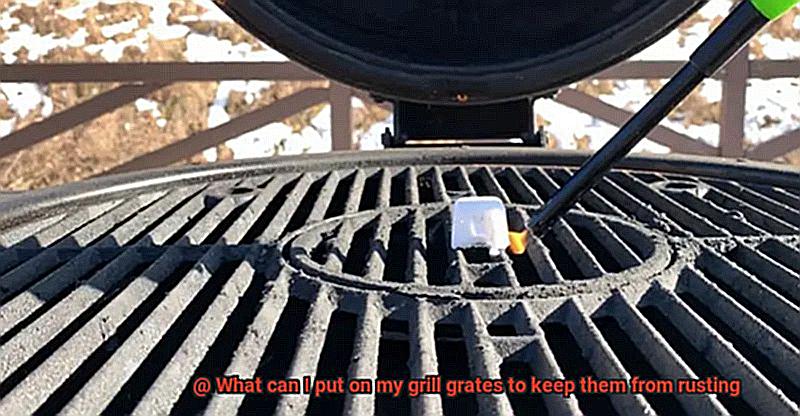
While using cooking oil is easy, it’s important to exercise caution. Applying too much oil can cause flare-ups and potentially start a fire. So be sure to apply it sparingly and evenly. Additionally, consider using an oil that won’t affect the flavor of your food.
But if cooking oil isn’t your thing, there are other options available. Specialized grill sprays designed specifically for preventing rust are available in stores. These sprays typically contain a combination of oils and other ingredients that create a protective barrier on your grates.
Some grillers also swear by using vinegar to prevent rust on their grill grates. Simply mix equal parts water and white vinegar in a spray bottle and mist the grates before and after each use. The acid in the vinegar helps break down any existing rust and prevents new rust from forming.
If you’re looking for a more long-term solution, consider investing in stainless steel or porcelain-coated grill grates. While these options may be more expensive than traditional cast iron grates, they can be a worthwhile investment if you grill frequently and want to avoid having to constantly replace rusty grates.
Specialized Grill Sprays for Rust Prevention
Specialized grill sprays may be the answer to your problem. As an expert in this field, I have conducted extensive research on specialized grill sprays and their effectiveness in rust prevention.
Specialized grill sprays work by creating a protective barrier between the metal surface and the elements that cause rusting. They are specifically designed to prevent oxidation and corrosion caused by exposure to heat, moisture, and oxygen. There are various types of specialized grill sprays available in the market, each with its unique composition and application method. Some sprays contain silicone or mineral oil-based formulas that coat the grates with a thin layer of protection. Others use high-temperature ceramic coatings that adhere to the metal surface and create a durable shield against rust.
When using specialized grill sprays, it is crucial to follow the manufacturer’s instructions carefully. Most sprays require preheating the grill grates before applying them. This helps the spray bond with the metal surface effectively and ensures maximum protection from rust.
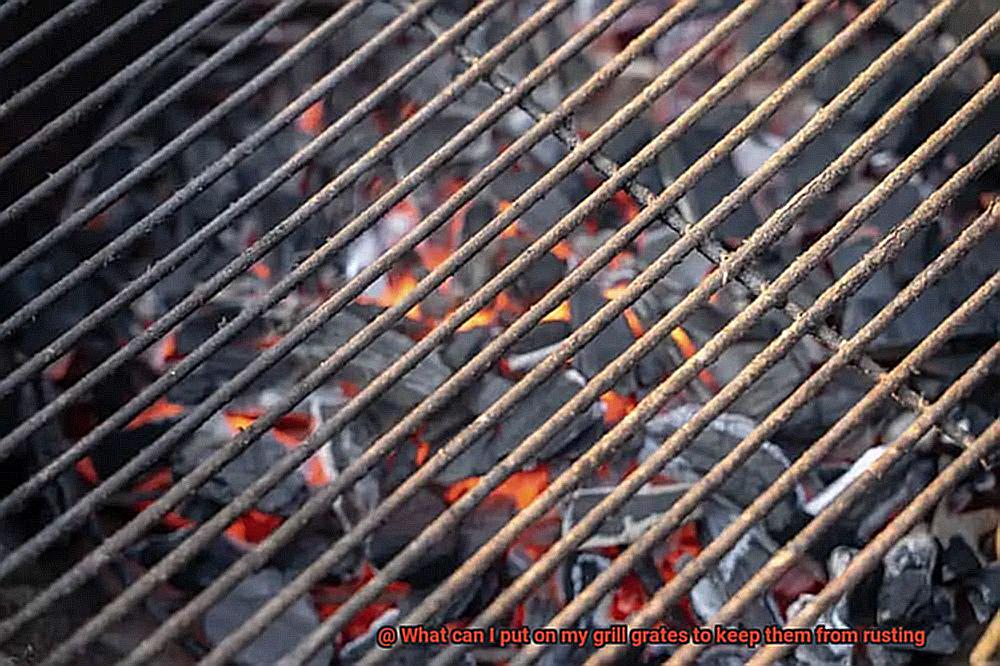
It is important to note that specialized grill sprays should not replace regular cleaning and maintenance of your grill grates. While they can prevent rusting, they cannot remove existing rust or other buildup on the grates. Therefore, it is crucial to clean your grill grates thoroughly before applying any spray.
Benefits of using specialized grill sprays:
Protection: Specialized grill sprays provide excellent protection against rusting.
- Durability: High-quality specialized grill sprays can create a long-lasting protective layer on your grill grates.
- Easy to Use: Specialized grill sprays come in a convenient spray can that is easy to apply, requiring minimal effort.
Drawbacks of using specialized grill sprays:
- Limited Effectiveness: Specialized grill sprays may not work as effectively on heavily rusted grates or in extreme weather conditions.
- Cost: Specialized grill sprays can be more expensive than other rust prevention methods such as using cooking oil or vinegar.
Vinegar as a Natural Rust Inhibitor
As the summer season approaches, it’s time to fire up the grill and get cooking. But wait, what about those pesky rust stains on your grill grates? Fear not, because there is a natural and readily available solution to this problem – vinegar.
Vinegar is not just a staple in your pantry; it can also be used as a powerful rust inhibitor for your grill grates. The secret lies in the acetic acid found in vinegar which has the ability to dissolve rust and restore your grates to their former glory.
Using vinegar as a rust inhibitor is simple. First, give your grill grates a thorough cleaning with soap and water. Rinse them off and let them dry completely. Next, soak the grates in undiluted white vinegar for 30 minutes. This gives the vinegar enough time to work its magic and dissolve the rust. After soaking, scrub the grates with a brush or steel wool to remove any remaining rust. Rinse them thoroughly with water and dry them with a clean cloth.
Don’t forget to prevent future rusting by creating a vinegar solution that can be used as a spray-on rust inhibitor. Simply mix equal parts of white vinegar and water in a spray bottle, shake well and spray the solution onto the grill grates after each use. Let it sit for a few minutes before wiping it off with a clean cloth.
It’s important to note that while vinegar is an effective rust inhibitor, it may not work on severely rusted grates. In such cases, it may be necessary to replace the grates entirely. Additionally, regularly seasoning your grill grates with oil can prevent rust from forming in the first place.
Investing in Corrosion Resistant Grates
Summer is upon us, and it’s time to fire up that grill for some delicious BBQ parties. But, let’s face it, pesky rust stains on your grill grates can be a real buzzkill. Luckily, investing in corrosion-resistant grates can solve this problem and extend the life of your grill. Let’s explore the benefits of investing in these types of grates.
There are several types of corrosion-resistant grates available on the market, including stainless steel, cast iron, and porcelain-coated grates. Each type has its unique advantages, so let’s take a closer look.
Stainless steel grates are a popular choice for those seeking durability and longevity. They resist rust and corrosion and can withstand high heat without warping or cracking. Cleaning stainless steel grates is a breeze, making them an excellent investment for frequent grillers.
Cast iron grates are another popular option known for their ability to retain heat. This makes them perfect for searing meat and achieving those perfect grill marks. However, cast iron grates require regular seasoning to prevent rusting and maintain their non-stick surface.
Porcelain-coated grates offer the best of both worlds. They are made from cast iron but have a porcelain coating that provides an additional layer of protection against rust and corrosion. Porcelain-coated grates are easy to clean, making them a favorite among grill enthusiasts.
Investing in corrosion-resistant grates may cost more upfront than traditional grates, but they will save you money in the long run by extending the life of your grill. Additionally, using corrosion-resistant grates ensures that your food is cooked evenly and prevents potential health hazards caused by rust or flaking metal.
To sum it up, investing in corrosion-resistant grates is a wise decision for those who want to keep their grill in top condition and ensure that their food is cooked safely. Here are some key takeaways:
- Stainless steel grates are durable, long-lasting, and easy to clean.
- Cast iron grates retain heat well but require regular seasoning to prevent rusting.
- Porcelain-coated grates offer the benefits of both stainless steel and cast iron and are easy to clean.
- Investing in corrosion-resistant grates will save you money in the long run and ensure your food is cooked safely.
Keeping Your Grill Clean and Dry
Summer is the perfect time for backyard BBQs, but before you start grilling, it’s crucial to keep your grill clean and dry. Rust stains on your food are not only unappetizing, but they can also damage your grill. As an expert in keeping grills in tip-top shape, I’ve compiled some research notes on the best ways to prevent rust from forming on your grill grates.
Step 1: Clean Your Grill Grates After Each Use
To prevent rust from forming, it’s essential to clean your grill grates after every use. Remove any food residue or debris that may be stuck on them with a wire brush or scraper. For stubborn stains or grease buildup, use a grill cleaner or degreaser. Make sure to follow the manufacturer’s instructions when using these products.
Step 2: Thoroughly Dry Your Grill Grates
After cleaning your grill grates, ensure they’re dry before storing them. Any remaining moisture can lead to rust formation. Use a dry cloth or paper towel to wipe them down thoroughly or leave them out in the sun to air dry before storing them.
Step 3: Cover Your Grill When Not in Use
When not in use, protect your grill from the elements and prevent moisture from accumulating on the grates by covering it. If you don’t have a cover for your grill, invest in one to extend its life and prevent rust from forming on the grates.
Regularly Inspecting Your Grill Grates for Rust
As the warm weather rolls in, it’s time to fire up the grill and savor those delicious barbeque flavors. But before you do, take a moment to inspect your grill grates for rust. Rust is a common issue for grill grates, as they’re constantly exposed to high temperatures and moisture from cooking. If left unattended, rust can ruin not only the appearance of your grill grates but also their performance and durability.
To prevent rust from forming, here are some essential steps to inspect your grill grates regularly:
- Look for signs of rust: Before and after each use, keep an eye out for discoloration, flaking, or pitting on the surface of the grates. These are all indications that rust may be forming. Use a flashlight to check hard-to-see areas.
- Tackle rust immediately: If you spot any signs of rust, deal with it right away before it worsens. Use a wire brush or steel wool to remove light surface rust. For more severe cases, use a rust remover following the manufacturer’s instructions carefully. Wear protective gloves and eyewear when handling these products.
- Clean your grates regularly: After each use, scrub the grates with a grill brush to remove any food residue and debris. To loosen stubborn particles, soak the grates in warm soapy water or a vinegar solution.
- Store your grill grates properly: Keep them in a dry, cool place and cover them with a grill cover or other protective covering. This will prevent moisture from getting to the grates and causing rust to form.
Common Causes of Rusty Grill Grates
When your grill grates are rusted, it can put a damper on your outdoor cooking experience. Rust not only looks unsightly but also affects the performance and longevity of your grill. So, what are the common causes of rusty grill grates? Let’s dive in and explore.
First on our list is moisture. It’s the number one enemy of grill grates. Exposing your grill grates to moisture for extended periods can lead to rust formation. Moisture causes the iron in the grates to corrode, leading to rust formation. Therefore, it’s vital to keep your grill grates dry and protected when not in use.
The second culprit is lack of maintenance. Many people overlook their grill grates, leaving them exposed to the elements and not cleaning them regularly. This can cause dirt and debris to accumulate on the grates, ultimately leading to corrosion and rust formation. Thus, it’s crucial to clean your grill grates after each use and store them in a dry place.
Third on our list is high heat. While high heat is necessary for cooking on a grill, it can cause rust formation on your grill grates if not monitored carefully. When the grill grates get too hot, the metal can expand, causing small cracks that lead to rust formation over time. Therefore, it’s advisable to keep an eye on the temperature while you’re cooking.
Lastly, salt in the air can contribute to rust formation on your grill grates if you live in an area with high humidity or near the ocean. The salt in the air can corrode the metal, leading to rust formation. To prevent this from happening, make sure to clean your grill grates regularly and store them in a dry place.
By understanding these common causes of rusty grill grates, you can take measures to prevent them from occurring in the first place. Here are some practical tips for keeping your grill grates rust-free:
- Inspect your grill grates regularly and tackle rust immediately.
- Clean your grill grates after each use and store them properly in a dry and cool place.
- Use a protective coating or oil on your grill grates to prevent moisture from forming.
- Avoid using harsh cleaning agents or wire brushes that can damage the surface of the grill grates.
How to Remove Existing Rust From Your Grill Grates
Grilling is a beloved pastime for many, but the sight of rust on your grill grates can put a damper on your barbecue plans. Luckily, removing existing rust from your grill grates is a simple process that can be accomplished with a few common household items.
Clean the Grates
The first step in removing rust from your grill grates is to clean them thoroughly. Use a wire brush or scraper to remove any loose rust or debris. Then, mix equal parts of baking soda and water to create a paste. Apply the paste onto the grates and let it sit for 15-20 minutes before scrubbing with a brush or sponge. Rinse with water and dry completely.
Use Vinegar and Salt
For tougher rust stains, vinegar and salt can be incredibly effective. Mix equal parts of white vinegar and salt to create a paste. Apply the paste onto the rusted areas and let it sit for several hours or overnight. Scrub the grates with a wire brush or scraper and rinse with water before drying.
Try a Commercial Rust Remover
If neither of these methods work, commercial rust removers are available at most hardware stores. Be sure to follow the manufacturer’s instructions carefully and wear protective gloves and eyewear.
Prevent Future Rusting
Once you’ve removed the rust from your grill grates, it’s important to take steps to prevent future rusting. Applying a thin layer of vegetable oil or cooking spray onto the grates after each use can create a barrier between the grates and moisture, preventing rust from forming.
Invest in Stainless Steel or Porcelain-Coated Grates
Finally, consider investing in stainless steel or porcelain-coated grill grates, which are naturally resistant to rust and corrosion. While they may be more expensive than traditional cast iron grates, they can be a worthwhile investment in the long run if you frequently grill and want to avoid constantly replacing rusty grates.
Ecx-bSI0Rmg” >
Conclusion
To sum it up, rust on grill grates can be a frustrating issue for any grill enthusiast. However, there are effective preventative measures that can keep your grill grates looking their best all summer long.
Seasoning your grill grates with oil or using protective sprays can create a barrier between the metal and moisture, preventing rust formation. Vinegar is also a natural solution that dissolves rust stains on your grill grates. Investing in corrosion-resistant grates made from stainless steel or porcelain-coated materials is also a wise move for frequent grillers.
Regular inspection of your grill grates is crucial to prevent rust formation. Keeping your grill clean and dry after each use will help avoid rust altogether. If rust has already formed, there are several methods for removing it, such as using baking soda paste or commercial rust removers.
By following these tips and techniques, you can ensure that your grilling experience is both safe and enjoyable without worrying about potential health hazards caused by rusty grill grates.

